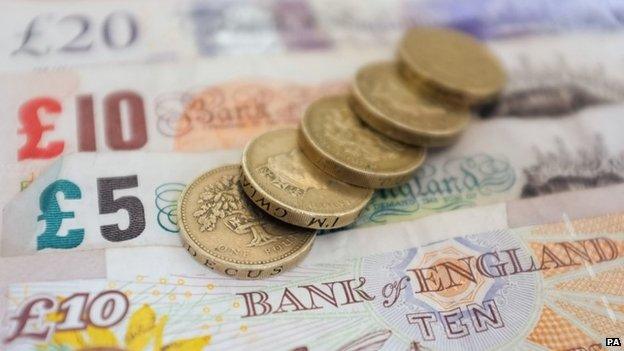New term needed for zero inflation and positive growth
- Published

The latest inflation figure for the UK revealed record low Consumer Prices Index (CPI) inflation of 0%, while the US figure expected later on Tuesday is expected to show a negligible increase in prices from a year ago.
However, both economies are recovering, and well enough that there's an expectation of interest rate rises on the horizon.
The normal pattern is for prices to rise alongside economic output. So when the economy is growing, so is demand for goods and services and thus their prices.
It's not just GDP, but employment is also expanding. The UK has a record high number of people in work, while US unemployment is falling and expected to recover to the pre-recession rate of 5%, according to the Federal Reserve.
There was one other period that required a new term to describe an unusual time.
In the 1970s, stagflation referred to high inflation while output was falling - precisely the opposite of what is happening today, but similarly goes against normal economic relationships.
The reason then, as now, is oil price shocks.
In the 1970s, two wars in the Middle East caused oil prices to shoot up and raise prices, which remained elevated despite slowing economic activity.
Since the shocks were external, and there was little capacity for economies like the US to respond domestically, the result was the unusual combination of sustained high inflation during a recession.
In the past few years, the UK also saw high inflation despite the worst recession in decades. You may recall that the Bank of England routinely described it as imported price pressure. The governor said that high energy and commodity prices were raising costs and there was zero domestically-generated inflation.
Breathing space
Now we have the opposite - there are price movements, but these stem from cheaper imported energy. Oil prices have plummeted since last summer. The Office for National Statistics (ONS) says the UK's record low 0% CPI has been driven by energy prices (motor fuels) falling 16.6% in the past year to February. It's also down to food prices, another sizeable imported commodity, which fell by 3.4%.
This means, though, that when volatile elements like energy and food are stripped out of CPI, core inflation is still positive at 1.2%. So, prices are rising and the economy isn't truly deflationary.
Still, factory gate prices, or the prices of goods sold by UK manufacturers, are seeing deflation, falling by 1.8% from a year earlier, external. That eventually feeds through to what we pay in stores. But, so many goods are imported, the more important price indicators are most likely to come from abroad. For instance, China is experiencing low price pressures that will be exported.
A little breathing space in terms of the costs of energy, food, and consumer goods is welcome after years of high inflation and below-trend growth.
The big question is how worried we should be about deflation. The Bank of England says that any deflation will be temporary. In other words, it's unlikely to be 15 years of falling prices as in Japan.
In any case, for now, falling prices while the economy is growing well may warrant a new term. Suggestions are welcome!